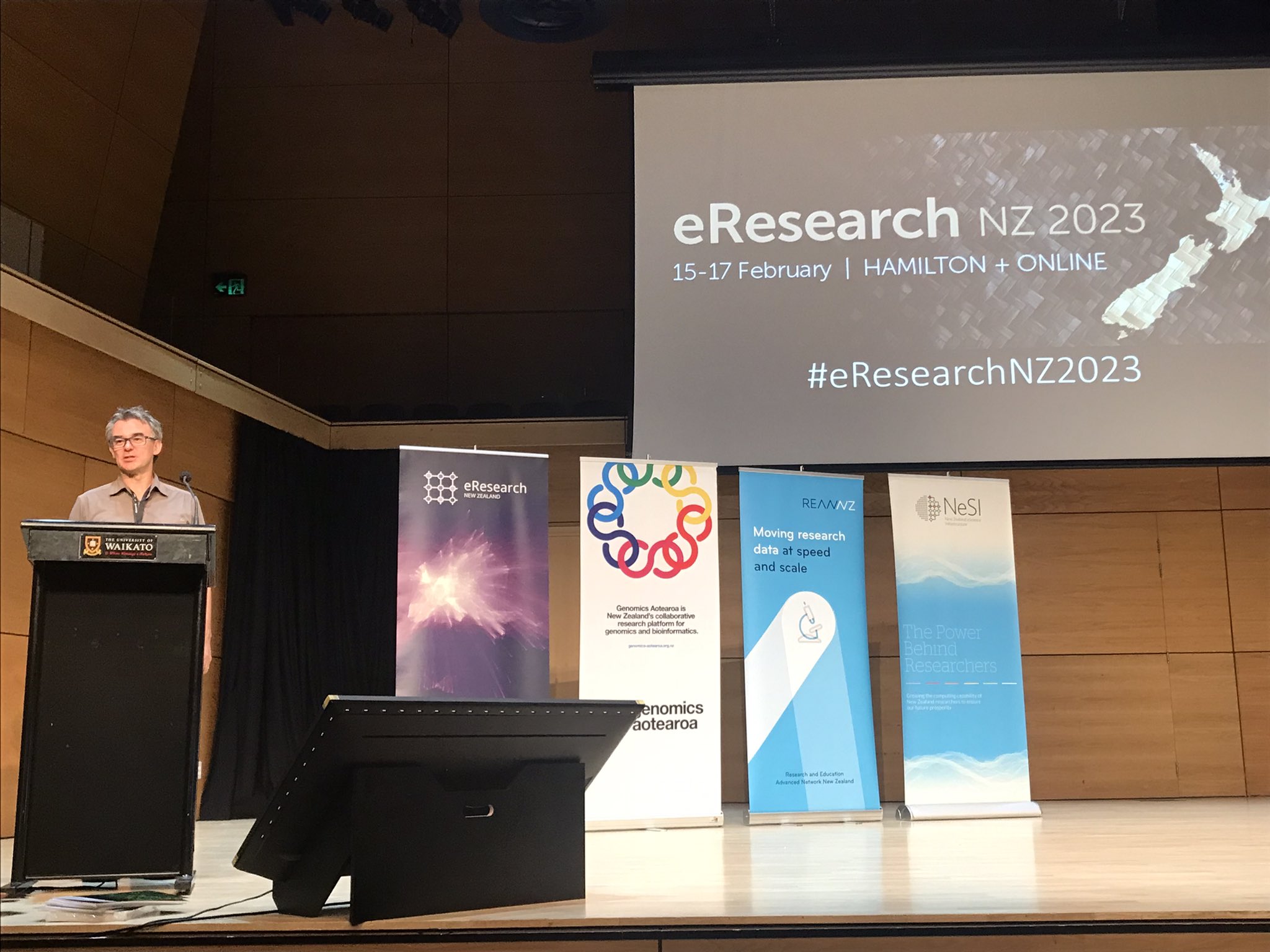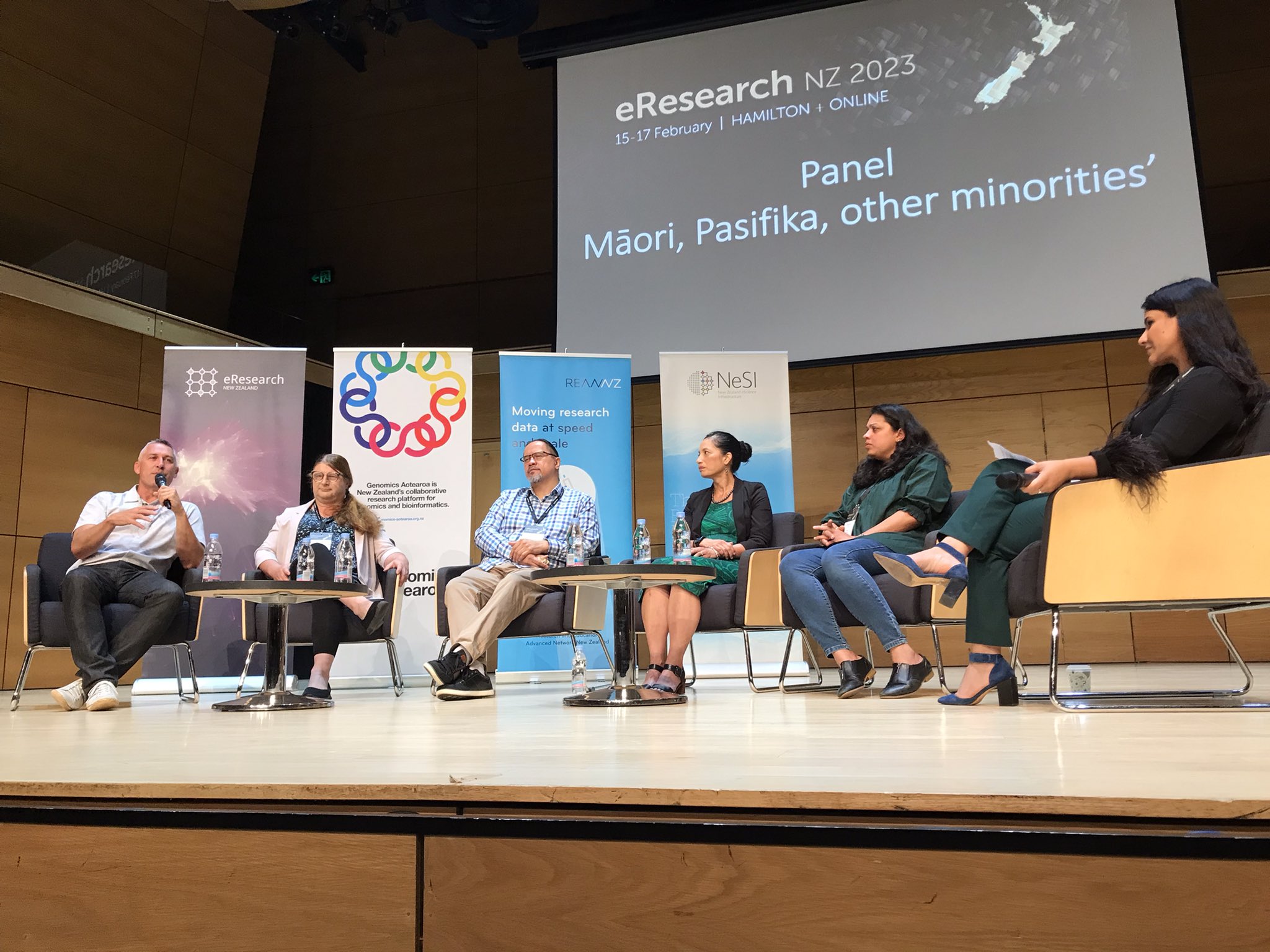Reflecting on Capability, Connectivity and Equity at eResearch NZ 2023
Digital equity, data in research, partnership-led approaches, and building capability and diversity across research communities were centre stage topics at the 2023 eResearch NZ Conference at Te Whare Wananga o Waikato University of Waikato.
Marking nearly two years since community members had gathered in person for this annual event, the programme plenaries, workshops, presentations and Birds-of-a-Feather discussions showcased the spectrum of eResearch, with a strong focus on research and initiatives in collaboration with tangata whenua. The overarching theme for the 2023 programme was Capability, Connectivity and Equity.
"This conference is our opportunity to discuss these issues, exchange our ideas, and listen to our friends and colleagues," said 2023 Conference Chair Mik Black. "It is also our chance to share the stories of our work, to learn about new tools and concepts, and to join in planning for the future."

Sharing knowledge, building connections
Braving the recent disruption of Cyclone Gabrielle, research communities from the length of the country and across the Tasman Sea gathered together in-person or joined online. Keynote speakers Professor Wyeth Wasserman and Dr Warren Williams each shared unique experiences and expertise on forming mutual, trust-based connections with indigenous communities here and abroad.
Prof. Wasserman spoke about the Silent Genomes project, which aims to reduce gaps & inequities in health for indigenous peoples in Canada, especially in rare disease diagnosis process. His talk highlighted how bioinformatics can be enabling to the process and implementation of governance models.
Dr Williams' talk explored the building of research capability, connectivity and equity within a Māori context. It shared experiences and aspirations that relate to Māori communities, research, and Mātauranga Māori.
"My primary interests are in Research Data Management and Māori data sovereignty. It was inspiring to hear how other institutions are working practically in this space."
- survey feedback from an eResearch NZ conference attendee
Other highlights from the 2023 eResearch NZ programme included:
- Carpentry Connect hosted as a pre-conference event to bring together internationally recognised instructors in the fields of Software Carpentry, Data Carpentry and Library Carpentry skills (collectively called The Carpentries) to discuss the future of digital skills education in Aotearoa New Zealand. A summary of highlights from the day are shared here by NeSI Research Communities Advisor - Training, Nisha Ghatak.
- John Creech from the Ministry of Business, Innovation and Employment (MBIE) presenting on MBIE's role as both a funder of research in Aotearoa New Zealand and as a kaitiaki of the Research, Science and Innovation (RSI) system. John shared some of the ongoing work at MBIE across those roles, including the recently announced Horizon Europe funding programme.
- Libby Liggins, Associate Professor at Massey University, and Maui Hudson, Associate Professor and Director of Te Kotahi Research Institute at the University of Waikato, hosting a session to discuss existing modes for including Indigenous metadata alongside data. They explored how we can support the uptake of Māori metadata in our data and research practice and what Māori metadata would be ideally retained in future.
- A workshop to translate the approach and findings of an Australian initiative on the characteristics of research data and its supporting infrastructures at scale, and catalyse a similar initiative in Aotearoa New Zealand. It workshop reviewed the emerging ‘Macro View’ of data developed by the Research Data Culture Conversation and used first hand data from participating New Zealand Institutions and case studies from both NZ and Australia to explore the process and findings so far. A series of presentations from research institutes shared activities underway that support infrastructure at scale.
- A workshop hosted by the Aotearoa New Zealand National Committee on Data in Research (CoDiR) to share framing and gather input on a national landscape review and help the project team crowdsource the challenges and opportunities we face as a sector.
- Birds-of-a-Feather (BoF) discussions around:
- FAIR principles for research software
- tips for building communities of practice
- institutional approaches to sensitive data
- incentivising open research
- A plenary panel that explored equity and engagement of Māori, Pasifika, immigrant, LGBTQIA+, and other minority communities in eResearch. Panelists shared personal experiences and discussed needs around making space for voices and visibility of minorities, “listen first, talk second” approaches, and the importance of looking beyond perceptions and stereotypes.

"It's inspiring to hear what other organisations are doing in the eResearch space."
- survey feedback from an eResearch NZ conference attendee
NeSI highlights
Members of the NeSI team attended eResearch NZ, hosting talks and collaborating on presentations to share insights and use cases from our projects and partnerships. Summaries of their sessions are noted below:
- Alexander Pletzer & Maxime Rio (NeSI) and Hilary Oliver (NIWA): Common workflows patterns in scientific computing
This session discussed how researchers can make their workflows resilient to hardware and other failures, a prime concern for long running simulations.
- Claire Rye (NeSI), Richard Tumaliuan (REANNZ), and Greg D'Arcy, Ryan Fraser, Chris Myers (AARNet): Accelerating data movement between New Zealand and Australia
Claire and Greg presented early results and learnings from trans-Tasman data transfers, along with future-plans for rollout across Australia and New Zealand to support growing data needs of researchers.
- Nisha Ghatak (NeSI), Murray Cadzow (University of Otago), and Tom Saunders (University of Auckland): Building research capabilities with The Carpentries
This BoF outlined the training efforts of the Carpentries community in New Zealand, and explore the future of Carpentries-based training events in Aotearoa.
- Nick Jones (NeSI): eResearch, NeSI and beyond
This talk discussed some of the recent strategic developments in Aotearoa New Zealand's science system (eg. Te Pae Kahurangi's review of the Crown Research Institutes; Te Ara Paerangi's outline of needs for transformation of the science system; and the eResearch Report's exploration of how to power up our eResearch capabilities nationally) and explored how to encourage greater aspiration and action towards meeting our future eResearch needs.
- Georgina Rae and Jun Huh (NeSI): Taking an Agile Service Management Perspective at NeSI
This session shares a look at how NeSI is using an Agile Service Management approach to its ways of working and service development processes as it co-designs, develops, and rolls out a variety of new services through its new Flexible HPC platform
- Blair Bethwaite: AgResearch's eResearch Infrastructure - A capability development journey with NeSI
This talk provides an update on AgResearch's partnership with NeSI to help build and support a highly integrated and connected eResearch Infrastructure as an early tenant of NeSI's new Flexible HPC cloud platform. Blair shared technical updates, early use-cases, insights into data management and migration, and discussed the challenges tackled in building a pathfinder for national delivery of mid-tier HPC.
- Chris Scott (NeSI) and Jiawei Zhang (Scion): War on Wildings - Continuing Flow Transport Model development
This presentation shares highlights from a Consultancy project where NeSI Research Software Engineers worked with a Scion researcher to improve their model to identify the spatial extent and distribution of the long-distance conifer seed dispersal . Such information can be used operationally to provide information for wilding conifer management in the fight against the invasive species. model more accessible and practical for operational use.
- Maxime Rio (NeSI) and Alan Tan (NIWA): Hyperparameter optimisation for Machine Learning - A little bit of theory and practice
This talk looks at a Consultancy project and how it applied common techniques for tuning a machine learning model. Maxime and Alan discussed each technique's strengths and weaknesses and shared an illustration in a context of models developed at NIWA to improve weather station related products.
- Jana Makar (NeSI), Yvette Wharton (University of Auckland), Yesh Ramesh (REANNZ): Building diverse teams through inclusive hiring practices
This BoF session included three lightning talks of experiences, advice, and approaches organisations in our sector have adopted to consider diversity and inclusion when building their teams.
- Callum Walley and Wes Harrell (NeSI): Working with Singularity Containers (Interactive Workshop)
This half-day hands-on workshop covered the essential aspects of using Singularity on NeSI's HPC platform, including the basics of containerisation, how to run and interact with containers, and how to create new containers.
- Jun Huh: Flexi HPC - Enabling new ways of eResearch
This talk covered some of the motivations and early use-cases for NeSI's new Flexible HPC infrastructure, walking through the initial tenants, and highlighting key partnerships and integrations.
- Claire Rye, Jun Huh, Matt Pestle, Nathalie Giraudon, Eirian Perkins, Kenny Zhao (NeSI), Huti Watson and Muhammad Qasim (Ngāti Porou Hauora), Cristin Print and Ben Curran (University of Auckland), Ben Te Aika, Stephen Robertson and Phillip Wilcox (University of Otago), Helen Wihongi (Waitemata District Health Board), Donia Macartney-Coxson, Joep de Ligt, (Institute of Environmental Science and Research): Rakeiora a pathfinder for genomic medicine - Building a prototype Genomics Platform
The Rakeiora project is a ‘pathfinder’ to prototype how best to acquire, protect, use and store genomic datasets for analysis support of primary and tertiary health research in Aotearoa New Zealand. As the Rakeiora project reaches the end of its prototype phase, the team used this session to reflect on the journey thus far, the design decisions, lessons learnt, and to demo the platform.
If you have any questions about any of NeSI's presentations or would like to learn more about NeSI's work in these areas, get in touch.
What is eResearch NZ?
For the last 14 years, the eResearch NZ conference series has provided an important national forum for strategic discussions, community building, and career development.
Co-hosted by NeSI, Genomics Aotearoa, and REANNZ, it is Aotearoa New Zealand's premier national gathering for communities who are exploring or innovating the ways digital tools and techniques can be used to advance research outcomes.
Through presentations, panel discussions, workshops, and networking opportunities, the eResearch NZ conference aspires to:
- Showcase innovative work-in-progress or recent project results where digital tools were applied.
- Highlight current and emerging priorities, trends, and best practices in eResearch approaches.
- Provide opportunities for skills training, professional development, and mentoring in digital research tools and eResearch applications.
- Draw experience and inspiration from research programs and projects in other regions.
- Build communities of practice that foster and support collaboration, knowledge-sharing, and Vision Mātauranga approaches.
- Work collaboratively with mana whenua organisations to foster mutually beneficial contributions to the eResearch NZ programme.
More information
- Follow @eResearchNZ
- Join our eResearch NZ event mailing list for updates
- Get in touch with questions or feedback
- Save the date for eResearch NZ 2024! (details TBC but timing will be similar in early February)





